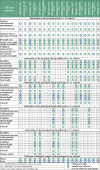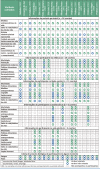Brazilian cohorts with potential for life-course studies: a scoping review
- PMID: 32491093
- PMCID: PMC7234216
- DOI: 10.11606/s1518-8787.2020054001825
Brazilian cohorts with potential for life-course studies: a scoping review
Abstract
OBJECTIVE To identify the Brazilian cohorts that started either in the prenatal period or at birth, to describe their characteristics and the explored variables, and to map the cohorts with potential for studies on early determinants on health and the risk of falling ill on later stages of the life cycle. METHODS A scoping review was carried out. The articles were searched in the electronic databases PubMed and Virtual Health Library (VHL). The descriptors used were [((("Child" OR "Child, Preschool" OR "Infant" OR "Infant, Newborn") AND (Cohort Studies" OR "Longitudinal Studies")) AND "Brazil")]. The inclusion criteria were Brazilian cohorts that started the baseline in the prenatal period or at birth and with at least two follow-ups with the participants. In order to meet the concept of LCE, we excluded those cohorts whose follow-ups were restricted to the first year of life, as well as those that did not address biological, behavioral and psychosocial aspects, and cohorts with data collection of a single stage of the life cycle. RESULTS The search step identified 5,010 articles. Eighteen cohorts were selected for descriptive synthesis. The median number of baseline participants was 2,000 individuals and the median age at the last follow-up was 9 years. Sample loss at the last follow-up ranged from 9.2 to 87.5%. Most cohorts monitored two phases of the life cycle (the perinatal period and childhood). The Southern region had the highest number of cohorts. The main variables collected were sociodemographic and environmental aspects of the family, morbidity aspects, nutritional practices and lifestyle. CONCLUSIONS We recommend the continuity of these cohorts, the approach to different social contexts and the performance of follow-ups with participants in different phases of the life cycle for the strengthening and expansion of life course epidemiology analyses in Brazil.
OBJETIVO: Identificar as coortes brasileiras iniciadas no período pré-natal ou no nascimento, descrever suas características e as variáveis exploradas, além de mapear as coortes com potencial para se estudar os determinantes precoces de saúde e doença e o risco de adoecer em etapas posteriores do ciclo vital.
MÉTODOS: Realizou-se uma revisão de escopo. A busca dos artigos foi realizada nas bases de dados PubMed e Biblioteca Virtual em Saúde em 16 de junho de 2018. Os descritores utilizados foram [(((“Child” OR “Child, Preschool” OR “Infant” OR “Infant, Newborn”) AND (“Cohort Studies” OR “Longitudinal Studies”)) AND “Brazil”)]. Os critérios de inclusão foram coortes brasileiras que iniciaram a linha de base no período pré-natal ou no nascimento e com pelo menos dois acompanhamentos com os participantes. Foram excluídas as coortes cujos acompanhamentos foram restritos ao primeiro ano de vida, as que não abordaram aspectos biológicos, comportamentais e psicossociais e também aquelas com coleta de informações em um único estágio do ciclo vital.
RESULTADOS: A etapa de busca identificou 5.010 artigos. Foram selecionadas 18 coortes para a síntese descritiva. A mediana do número de participantes na linha de base foi 2.000 indivíduos e a mediana de idade no último acompanhamento foi 9 anos. A perda amostral no último acompanhamento variou de 9,2 a 87,5%. A maioria das coortes realizou acompanhamentos em duas fases do ciclo vital (período perinatal e infância). A região Sul contemplou o maior número de coortes. As principais variáveis coletadas foram sociodemográficas e ambientais da família, aspectos de morbidade, práticas alimentares e estilo de vida dos participantes.
CONCLUSÕES: Recomenda-se a continuidade dessas coortes, a abordagem de diferentes contextos sociais e a realização de acompanhamentos com os participantes em diferentes fases do ciclo vital para o fortalecimento e ampliação das análises de epidemiologia do ciclo vital no Brasil.
Conflict of interest statement
Conflict of interest: The authors declare no conflict of interest.
Figures






Similar articles
-
The epidemiological transition in maternal and child health in a Brazilian city, 1982-93: a comparison of two population-based cohorts.Paediatr Perinat Epidemiol. 2001 Jan;15(1):4-11. doi: 10.1046/j.1365-3016.2001.00320.x. Paediatr Perinat Epidemiol. 2001. PMID: 11237113
-
An Inventory of European Birth Cohorts.Int J Environ Res Public Health. 2020 Apr 28;17(9):3071. doi: 10.3390/ijerph17093071. Int J Environ Res Public Health. 2020. PMID: 32354101 Free PMC article.
-
Methodology of the Pelotas birth cohort study from 1982 to 2004-5, Southern Brazil.Rev Saude Publica. 2008 Dec;42 Suppl 2(Suppl 2):7-15. doi: 10.1590/s0034-89102008000900003. Rev Saude Publica. 2008. PMID: 19142340 Free PMC article.
-
Maximising the potential of Chinese birth cohort studies: a systematic review of mother-baby cohorts in mainland China.Public Health. 2024 Feb;227:119-130. doi: 10.1016/j.puhe.2023.11.035. Epub 2024 Jan 1. Public Health. 2024. PMID: 38168592 Review.
-
Evidence of Impact of Interventions on Growth and Development during Early and Middle Childhood.In: Bundy DAP, Silva ND, Horton S, Jamison DT, Patton GC, editors. Child and Adolescent Health and Development. 3rd edition. Washington (DC): The International Bank for Reconstruction and Development / The World Bank; 2017 Nov 20. Chapter 7. In: Bundy DAP, Silva ND, Horton S, Jamison DT, Patton GC, editors. Child and Adolescent Health and Development. 3rd edition. Washington (DC): The International Bank for Reconstruction and Development / The World Bank; 2017 Nov 20. Chapter 7. PMID: 30212122 Free Books & Documents. Review.
Cited by
-
Exposome and Social Vulnerability: An Overview of the Literature Review.Int J Environ Res Public Health. 2022 Mar 16;19(6):3534. doi: 10.3390/ijerph19063534. Int J Environ Res Public Health. 2022. PMID: 35329217 Free PMC article. Review.
-
European birth cohorts: a consideration of what they have addressed so far.BMC Pediatr. 2022 Sep 15;22(1):548. doi: 10.1186/s12887-022-03599-2. BMC Pediatr. 2022. PMID: 36109711 Free PMC article.
-
Scoping Review of Oral Health-Related Birth Cohort Studies: Toward a Global Consortium.J Dent Res. 2022 Jun;101(6):632-646. doi: 10.1177/00220345211062475. Epub 2022 Jan 10. J Dent Res. 2022. PMID: 35012400 Free PMC article. Review.
-
Determinants of obesity in Latin America.Nat Metab. 2024 Mar;6(3):409-432. doi: 10.1038/s42255-024-00977-1. Epub 2024 Mar 4. Nat Metab. 2024. PMID: 38438626 Review.
-
Early childhood care, support and research: how early screening and longitudinal studies can help children thrive.J Pediatr (Rio J). 2021 Nov-Dec;97(6):579-581. doi: 10.1016/j.jped.2021.05.001. Epub 2021 May 18. J Pediatr (Rio J). 2021. PMID: 34019848 Free PMC article. No abstract available.
References
-
- 1. Kuh D, Bem-Shlomo Y, Susser E, editors. A life course approach to chronic disease epidemiology. New York: Oxford University Press; 2004.
- Kuh D, Bem-Shlomo Y, Susser E, editors, editors. A life course approach to chronic disease epidemiology. New York: Oxford University Press; 2004.
-
- 2. Ben-Shlomo Y, Kuh D. A life course approach to chronic disease epidemiology: conceptual models, empirical challenges and interdisciplinary perspectives. Int J Epidemiol. 2002;31(2):285-93. 10.1093/ije/31.2.285 - DOI - PubMed
- Ben-Shlomo Y, Kuh D. A life course approach to chronic disease epidemiology: conceptual models, empirical challenges and interdisciplinary perspectives. Int J Epidemiol. 2002;31(2):285–293. doi: 10.1093/ije/31.2.285. - DOI - PubMed
-
- 3. Kuh D, Ben-Shlomo Y, Lynch J, Hallqvist J, Power C. Life course epidemiology. J Epidemiol Community Health. 2003;57(10):778-83. 10.1136/jech.57.10.778 - DOI - PMC - PubMed
- Kuh D, Ben-Shlomo Y, Lynch J, Hallqvist J, Power C. Life course epidemiology. J Epidemiol Community Health. 2003;57(10):778–783. doi: 10.1136/jech.57.10.778. - DOI - PMC - PubMed
-
- 4. Buka SL, Rosenthal SR, Lacy ME. Epidemiological study designs: traditional and novel approaches to advance life course health development research. In: Halfon N, Forreest CB, Lerner RM, editors. Handbook of life course health development. New York: Springer; 2018. p. 541-60. - PubMed
- Buka SL, Rosenthal SR, Lacy ME. Epidemiological study designs: traditional and novel approaches to advance life course health development research. In: Halfon N, Forreest CB, Lerner RM, editors, editors. Handbook of life course health development. New York: Springer; 2018. pp. 541–560. - PubMed

